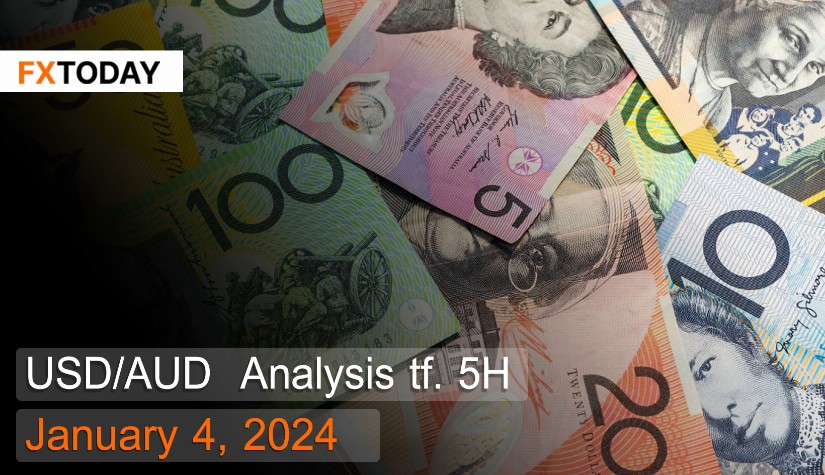The Australian economy remains resilient.
The Australian dollar is holding steady at around 1.48 USD per Australian dollar, facing pressure due to the recovery of the US dollar. Investor expectations regarding the reduction of interest rates by the US Federal Reserve are causing adjustments in the returns of the Australian Treasury, with predictions suggesting that the Reserve Bank of Australia's interest rate adjustments will mirror those of several countries influenced by the Fed, albeit at a slightly slower pace.
The leading economic indicator, reflecting economic activity compared to the next 3-9 months in Australia, increased by 0.1% month-on-month in November. This indicates a slight improvement in consumer confidence and a continuous downward trend in inflation.
The Purchasing Managers' Index (PMI) in the manufacturing sector decreased to 47.6 in December, marking the 10th consecutive month of decline. Both domestic and international demands continue to decrease, impacting production levels. Purchasing activities, inventory levels, and employment have decreased, along with a contraction in manufacturing. However, cost pressures due to inflation persist, although confidence is expected to improve gradually over the year.
Private sector credit in Australia increased by 0.4% month-on-month in November. While this uptick signals positive signs, the growth of private sector credit was at 0.5% year-on-year, demonstrating a continuous expansion primarily in housing credit. However, personal credit decreased by 0.1% following a previous increase of 0.2%, indicating that recent interest rate hikes have started affecting household credit.
The Australian housing value index increased by 0.4% in December. Tim Lawless, CoreLogic's research director, attributed this modest rise to increased cost-of-living pressures, reducing people's ability to pay and subsequently dampening consumer confidence in the property market. This downward trend has been noticeable for the past six months.
The yield on Australian 10-year government bonds increased by over 4%, aligning with the rebound seen in US Treasury yields. This follows renewed assessments by investors and analysts regarding the US Federal Reserve's monetary policy trends. Currently, the market perceives a 70% chance of a rate cut by the US Federal Reserve in March, down from earlier expectations of 90%. Moreover, recent reports from the Reserve Bank of Australia indicate a second consecutive interest rate hike in December, aiming to efficiently and swiftly curb inflation.
Techical analysis data (5H)
Resistance: 1.4871, 1.4896, 1.4935
Support: 1.4807, 1.4768, 1.4744
Source: Investing.com
Buy/Long 1: If the price touches support in the price range of 1.4768 - 1.4807 but cannot break the support at 1.4807, you may set a TP at approximately 1.4896 and SL at around 1.4744 or according to your acceptable risk.
Buy/Long 2: If the price breaks the resistance in the price range of 1.4871 - 1.4896, you may set a TP at approximately 1.4935 and SL at around 1.4768 or according to your acceptable risk.
Sell/Short 1: If the price touches resistance in the price range of 1.4871 - 1.4896 but cannot break the resistance at 1.4871, you may set a TP at approximately 1.4768 and SL at around 1.4935 or according to your acceptable risk.
Sell/Short 2: If the price breaks the support in the price range of 1.4768 - 1.4807, you may set a TP at approximately 1.4744 and SL at around 1.4896 or according to your acceptable risk.
Pivot point January 4, 2024 06:56 PM. GMT+7
| Name | S3 | S2 | S1 | Pivot Points | R1 | R2 | R3 |
| Classic | 1.4744 | 1.4768 | 1.4807 | 1.4832 | 1.4871 | 1.4896 | 1.4935 |
| Fibonacci | 1.4768 | 1.4793 | 1.4808 | 1.4832 | 1.4856 | 1.4871 | 1.4896 |
| Camarilla | 1.4829 | 1.4835 | 1.4841 | 1.4832 | 1.4853 | 1.4859 | 1.4864 |
| Woodie's | 1.4752 | 1.4772 | 1.4815 | 1.4836 | 1.4879 | 1.4900 | 1.4943 |
| DeMark's | - | - | 1.4820 | 1.4838 | 1.4883 | - | - |
















